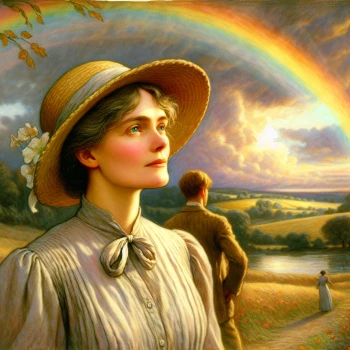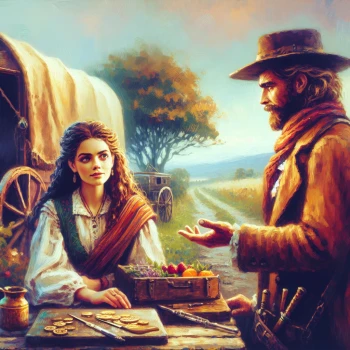
D H Lawrence
D.H. Lawrence was a visionary English writer known for exploring emotional authenticity, human relationships, and societal critique through novels like "Women in Love" and "The Rainbow."
Notable Works
D. H. Lawrence's literary legacy is vividly illustrated through his profound exploration of human relationships and emotional depth. His novel "Women in Love" stands as one of his most influential works, delving into the complexities of romantic and existential struggles between couples against the backdrop of early 20th-century England. The novel, along with its companion piece "The Rainbow," highlights Lawrence's skill in portraying the inner lives of characters such as Ursula Brangwen, whose journey toward self-awareness and personal liberation resonates powerfully with readers.
Another notable work, "The Virgin & The Gypsy," captivates readers with its romantic tension and exploration of societal constraints. This novella beautifully encapsulates Lawrence's recurring themes of desire, freedom, and the clash between convention and instinctive passion. Through these enduring literary contributions, Lawrence continues to be celebrated for his insightful examination of the human psyche and his unflinching portrayal of emotional authenticity.
Books by D H Lawrence
Overview & Analysis
D.H. Lawrence was an influential English novelist, poet, and essayist whose writing profoundly examined the complexities of human relationships, psychological depth, and emotional authenticity. Emerging during the transformative early 20th century, Lawrence's work vividly reflected societal upheavals brought about by industrialization, shifting class structures, and evolving moral attitudes. Through seminal novels such as "The Rainbow," "Women in Love," and "The Virgin & The Gypsy," he explored the internal moral evolution of his characters, delving into themes of emotional sincerity, personal integrity, and the critique of repressive social norms. Lawrence's richly symbolic and allegorical style challenged conventional morality, advocating for individual freedom against the constraints of capitalist ethics and authoritarian governance. Often controversial and provocative, his bold portrayal of human sexuality and psychological intensity stirred both acclaim and scandal, cementing his legacy as a visionary writer. His enduring influence lies in his passionate advocacy for emotional honesty, his incisive critique of societal conformity, and his profound exploration of the human condition, leaving an indelible mark on 20th-century literature.
Back to TopInfluences & Worldview
D.H. Lawrence was a deeply philosophical thinker whose worldview centered around the exploration of internal moral evolution and personal integrity. Coming of age at the cusp of the Edwardian era and early 20th century, he witnessed the profound societal shifts brought about by industrialization, changing class dynamics, and evolving social norms. Lawrence was notably critical of rigid class structures and capitalist morality, often highlighting the emotional and psychological toll they exacted on individuals. His richly symbolic and allegorical writing challenged conventional morality, advocating instead for emotional honesty, sincerity, and loyalty to one's own moral compass rather than blind conformity to institutional laws or societal expectations. His pacifist leanings and critique of authoritarian governance further underscored his commitment to individual freedom and integrity, positioning him as both a passionate advocate for personal authenticity and a staunch critic of oppressive social and political systems.
Relevant Historical Events
- Industrial Revolution (UK) (1760 – 1870): A time of rapid industrial, economic, and social change that restructured daily life and redefined childhood in Victorian England.
- The Victorian Era (1837 – 1901): The Victorian era was a period of significant change in the United Kingdom, marked by industrial, cultural, political, scientific, and military change within the United Kingdom, and was marked by a great expansion of the British Empire.
- Women's Suffrage Movement (UK) (1903 – 1928): A movement advocating for women's right to vote in the UK. It was a challenging fight against societal norms and political institutions, but it ultimately led to the Representation of the People Act 1928, granting all women over 21 the right to vote.
- World War I (1914 – 1918): A global conflict involving major world powers, characterized by unprecedented military casualties, economic upheaval, and profound societal changes.
Notable Characters
D H Lawrence is renowned for his complex, emotionally intense characters who grapple with internal struggles, societal conventions, and the transformative power of relationships. In "The Rainbow," Ursula Brangwen embodies Lawrence's exploration of women's independence and self-realization, navigating the tension between individual desires and traditional expectations. Similarly, Yvette Saywell in "The Virgin & The Gypsy" represents youthful defiance and curiosity, challenging the restrictive, middle-class morality of her upbringing through her attraction to the mysterious Gypsy, a symbol of liberation and passion.
Lawrence's characters frequently express a restless yearning for deeper personal fulfillment and authentic connection, often confronting the rigid societal norms of the Victorian and early 20th-century eras. These portrayals reflect Lawrence's own worldview, shaped by historical events such as the Industrial Revolution and the Women's Suffrage Movement, highlighting themes of self-awareness, sexual liberation, and a critical stance towards industrialization's alienation of the individual. Through characters like Ursula and Yvette, Lawrence vividly illustrates the complexities of human emotion and the relentless pursuit of genuine identity and freedom.
Back to TopThemes of Focus
D. H. Lawrence consistently explores themes of human relationships, sexuality, and the conflict between individuality and societal expectations. His narratives frequently delve into the complexities of emotional intimacy, often portraying the tension between personal desire and the restrictive conventions of early 20th-century British society. Lawrence's depiction of sexuality is candid and symbolic, reflecting his belief in the naturalness and vitality of human passion, set against a backdrop of restrictive Victorian and Edwardian morality.
Secondary themes such as industrialization and class struggle further reinforce his primary concerns, highlighting how societal pressures and economic transformations influence personal identity and relationships. These elements reflect the broader historical context of post-Industrial Revolution Britain, where rapid economic and social change disrupted traditional communities and family structures. Lawrence's worldview, critical of industrial modernity and sympathetic towards individual authenticity, underpins these thematic explorations, emphasizing a yearning for genuine emotional and spiritual connections amidst societal upheaval.
Back to TopLegacy & Impact
D.H. Lawrence significantly impacted literature and social thought by challenging prevailing societal norms, especially regarding class structures, gender roles, and personal morality. His novels and essays explored the complexities of human psychology, emotional sincerity, and internal moral evolution, influencing modernist literature and philosophy profoundly. Lawrence's bold treatment of sexuality and emotional authenticity sparked controversy and censorship in his time but laid essential groundwork for more open literary discussions of human relationships and individual freedom.
Today, his works such as "Women in Love" and "The Rainbow" remain widely studied in schools and universities, valued for their psychological depth and critique of industrial-era society. His characters, vividly real and psychologically complex, continue to resonate with readers confronting their own struggles with societal expectations and personal authenticity. Lawrence's themes advocating emotional honesty and personal integrity remain strikingly relevant in contemporary discussions surrounding mental health and societal conformity.
Despite historical controversies around explicit content, modern scholarship generally appreciates Lawrence's contributions to literature and philosophy, acknowledging his role in advancing discussions around individualism, emotional honesty, and societal critique. His legacy endures through academic discourse, literary adaptations, and ongoing scholarly reevaluations.
Back to TopConclusion
D.H. Lawrence's literary legacy endures powerfully into modern times, offering readers profound insights into the complexities of human emotions, relationships, and societal expectations. His passionate advocacy for emotional honesty and individual moral integrity continues to resonate deeply, especially in an age often dominated by conformity and superficiality.
Lawrence's visionary exploration of internal moral evolution and personal authenticity significantly shaped literary traditions, challenging prevailing norms and inspiring generations of writers to delve courageously into the emotional and psychological depths of their characters.
Today, readers who engage with Lawrence's stories find not only timeless reflections on human nature but also compelling encouragement to embrace genuine self-awareness and emotional sincerity. His work remains uniquely pertinent, reminding contemporary audiences of the importance of personal authenticity in navigating life's complexities.
Back to Top



